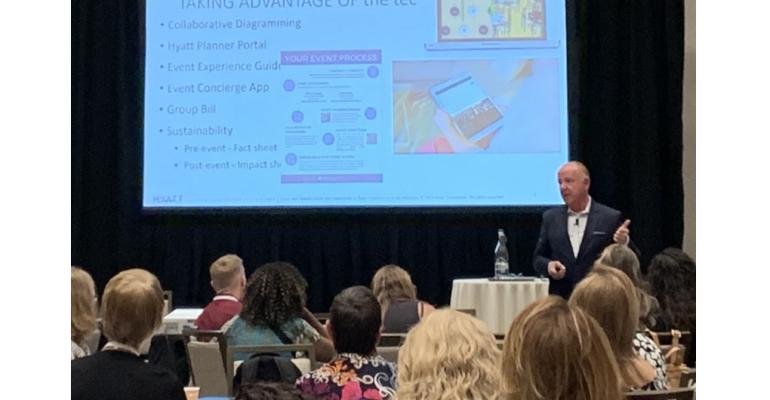In a pivotal moment for the meetings and hospitality industry—when business events are returning at levels surpassing 2019’s pre-pandemic heyday while hotels are desperately trying to staff up to fulfill the demand coming at them—there is an unusual frankness in the communication flowing between suppliers and planners.
One example: At the recent IMEX America show in Las Vegas, Steve Enselein, senior vice president of events for Hyatt Hotels, told an audience of more than 100 planners that “the loss of staff experience is the greatest challenge we have, and we are now trying to educate a lot of people from outside the industry in both sales and service roles.” Because of this, “hotels are operating differently—the hotel experience of 2019 is not coming back” for planners as they negotiate, coordinate, and execute their events.
The Nitty Gritty
The first bit of advice Enselein gave to planners to navigate the present landscape is to understand the departmental flow chart of the property that will host a meeting. “It could be that the director of sales, director of operations, or director of food and beverage oversees more than one hotel now,” he noted. “Also, sales and events might be a combined department at your host property. You should create a communication diagram for each area of your event so that you know who to approach for bigger issues and who to approach for smaller ones.”
One way to minimize labor-intensive changes: “Learn what program the hotel uses to diagram their event-room set-ups, then give the staff visual renderings of all your set-ups so there are no mistakes. There’s often not enough staff to flip a room on short notice anymore, or sometimes even to turn a ballroom overnight.” For smaller issues, Hyatt and some other hotel brands offer an “event concierge” app that planners can use when they want, for instance, to have a room’s temperature changed or have a refreshment station replenished.
For a meeting’s audiovisual requirements, Enselein recommended that planners be upfront about their budget allowance and their most critical needs. “Share details from last year’s program and what you paid for it,” he said. “It gives the vendor a map for giving you as much as possible for your budget.” One way for planners to save on audiovisual set-ups: “Stagger your breakouts that need more technology so that they can be held in the same room at different times.”
On the food and beverage front, Enselein noted that “the supply chain is still tough, so ordering early is important even for smaller meetings. Also, ask the head chef if another group is in house around the same time as yours. If so, you can piggyback on their order to make it easier for us and less expensive for you.”
Enselein said that buffets are back in style after being eliminated during the Covid pandemic, and that “deconstructed salads and meals set up at action stations let people mingle but also choose their own ingredients,” which reduces food-allergy concerns as well as food waste. “We really discourage planners from wanting to preset drinks and salads on tables,” he added. “It is labor-intensive and wasteful.”
Lastly, planners should inquire about the operating days and hours for each restaurant on property because some are not back to full-time operation due to labor challenges. The same goes for restaurants within walking distance of the host hotel.
Using the Personal Touch
With so many young hotel salespeople these days, planners might want to use Zoom for occasional check-ins in the run-up to the meeting rather than just communicating via email, Enselein suggested. “The young reps will use email for everything unless you request otherwise, and seeing each other—even on the computer—can help you build a relationship.”
Videoconferencing is also effective for pre-con meetings. Yes, planners should still get together in person with department heads and key contacts one or two days ahead of a meeting, said Enselein. But “having a brief videoconference with those people 10 days ahead will make things much easier to remedy” if there’s a discrepancy in what is expected in a given area, or if there is an emerging development with the group or with the property that could affect some aspect of the meeting.





